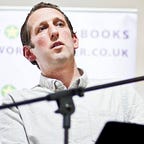Gordon Brown Saves the World
Gordon Brown is obviously a very clever man. But why is there something so strange about his widely lauded proposals today? (How do we raise trillions of dollars to fight the climate crisis? The answer is staring us in the face). They seem to operate in a world with no history or power, or relations between things.
Brown’s analysis starts promisingly: “Last year, the oil and gas industry across the world banked about $4tn, according to the head of the International Energy Agency. This represents one of the biggest redistributions of wealth from the world’s poor to the richest petrostates. The record energy prices that have produced these unearned gains have not only caused dramatically rising poverty and debt in the global south, but have also stymied decades of progress in extending power into homes, villages and towns that were previously without electricity.”
The figures are indeed staggering “…$4tn is a bigger sum than the entire UK economy and about 20 times all the international aid budgets of the world. It is 40 times the $100bn-a-year target for the global south that was pledged in 2009 for 2020 but never reached.”
This is the backdrop to COP (*checks notes* 28!!) the climate summit hosted by (*checks notes* the United Arab Emirates). The summit, Gordon tell us, will be chaired by Sultan Al Jaber, the head of the Abu Dhabi National Oil Company, which is one of the biggest beneficiaries of the windfall. No shit.
What is the answer to the climate problem? Well, its staring ‘us’ in the face and it’s to throw (oil) money at it. And who will be the great benevolent forces to save the planet?
Saudi Arabia.
Brown explains:
“A $25bn global windfall levy on oil and gas profits, paid by the richest petrostates, would amount to less than 1% of global oil and gas revenues and only 3% of the export earnings of these major producers. Each of the richest petrostates can easily afford to pay. The UAE has seen its export earnings rise from $76bn to $119bn; it can afford to contribute $3bn without any impact on the energy prices paid by its domestic consumers. And it is not alone: with Qatar’s export earnings, mainly from gas, rising from $53bn to $86bn it too could easily afford $3bn, as could Kuwait with its export earnings increasing from $63bn to $98bn.”
Such funds Brown explains would be combined with the ambitious Bridgetown Agenda (devised by the prime minister of Barbados, Mia Mottley) and the Summers-Singh plan which would bring the total funding for development kickstarted by the global windfall levy to $1tn.
To do what exactly?
It’s not exactly clear but he talks of how “to meet the climate and development needs of the global south.”
Seriously though, if Saudi money can be diverted to pay towards the Loss and Damage Fund all well and good, but the ideas from Brown seem to be afloat in the world — put forward as if change can happen without changing anything at all.
It’s certainly clear that the mayhem being unleashed on the global south by climate breakdown is horrific, escalating and incomprehensible. It’s certainly true that the petrostates profits are off-the-scale and grotesque. And it’s certainly true that mitigating the disaster is going to be costly. But little else of this makes sense.
Gordon is worried that a “breakthrough at Cop28 will elude us” but doesn’t seem to ask why a breakthrough eluded us at COPs 1–27? (!) He is entirely in rapture to a process that has completely failed.
Nor is this a one-off ‘windfall’ tax type situation. Brown suggests that: “…with oil and gas profits remaining high not as an accident but because of a deliberate Opec Organisation decision to continue to restrict production, there is no reason why the levy should not be paid on an annual basis.”
So just to run that by you again, we won’t do anything to alter the nature of the economy that is driving us into destruction, we’ll just ask nicely the most filthy-rich beneficiaries of that system if they’d mind giving us a trillion dollars to help out with the consequences of their product?
Brown himself admits that since Bretton Woods in 1944: “With the notable exception of paying for UN peacekeeping, no one then or since has ever agreed how the costs of funding global public goods would be shared.”
So there is no vehicle or precedent (or motivation) for the proposals. Gordon Brown is as likely to succeed in this as he was in “Abolishing the House of Lords” or “Creating Federalism in Britain”.
He is the $1 Trillion Dollar Man …
